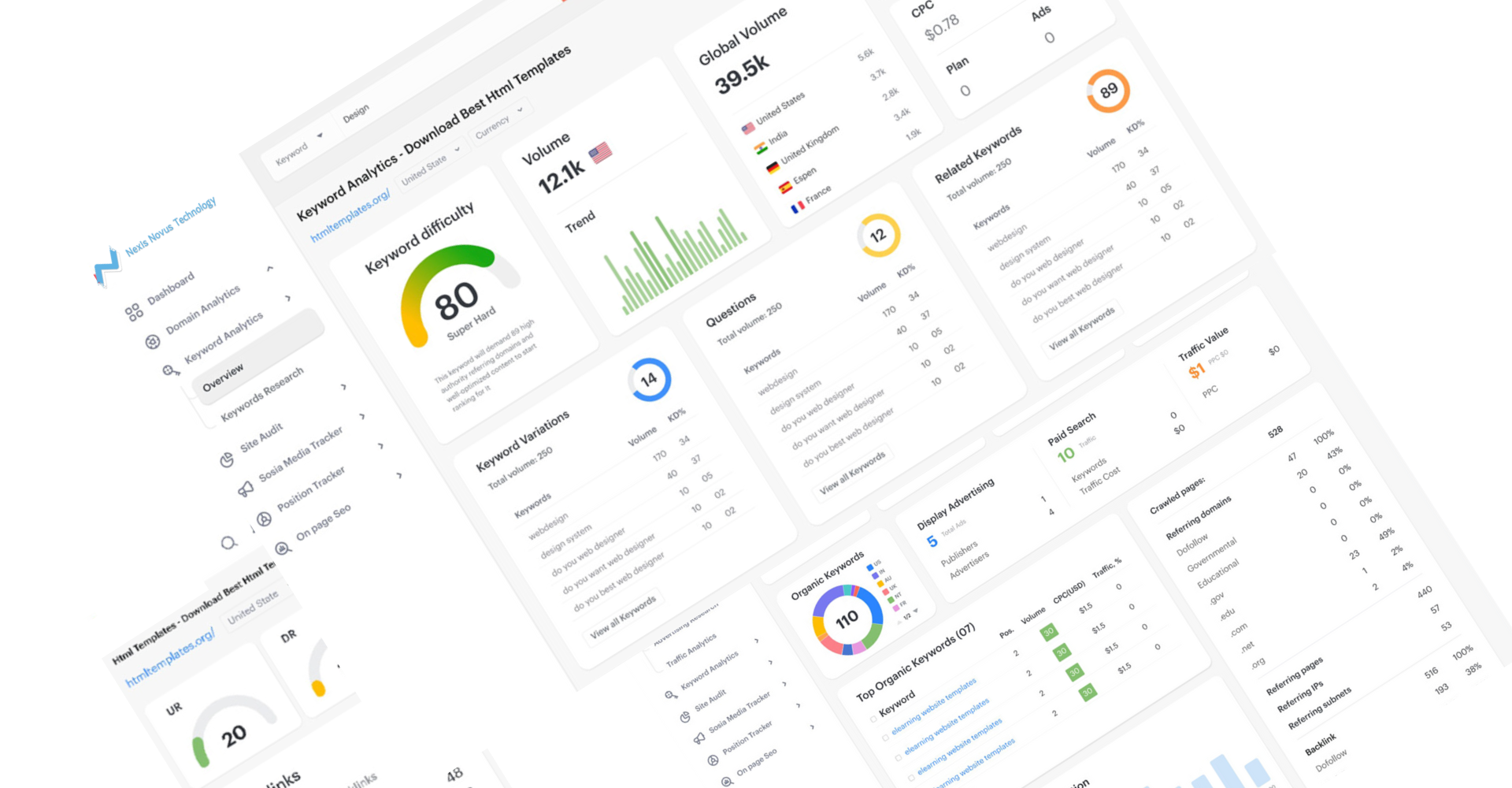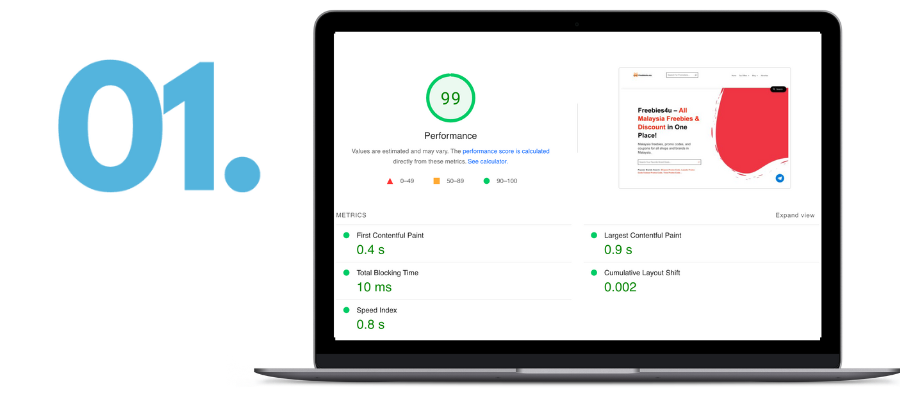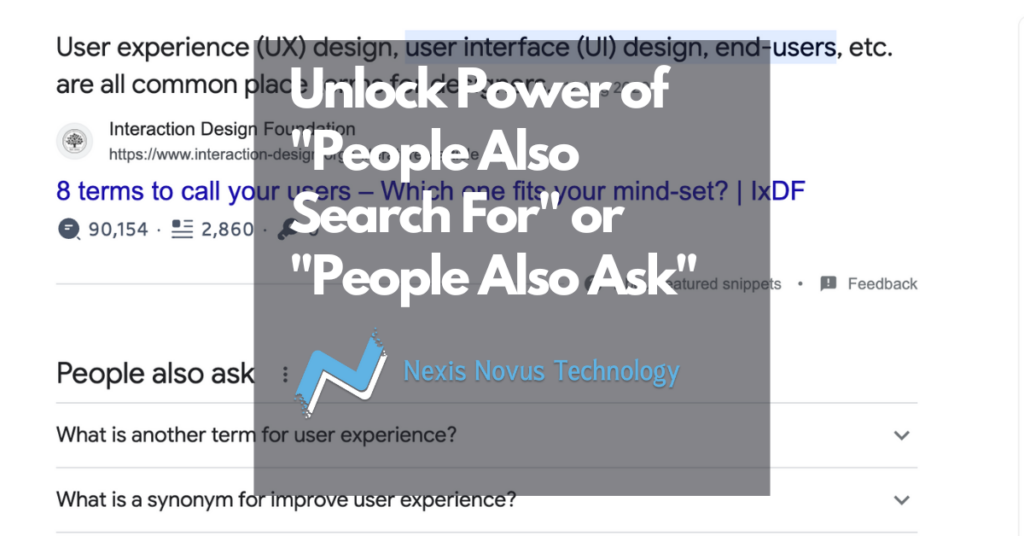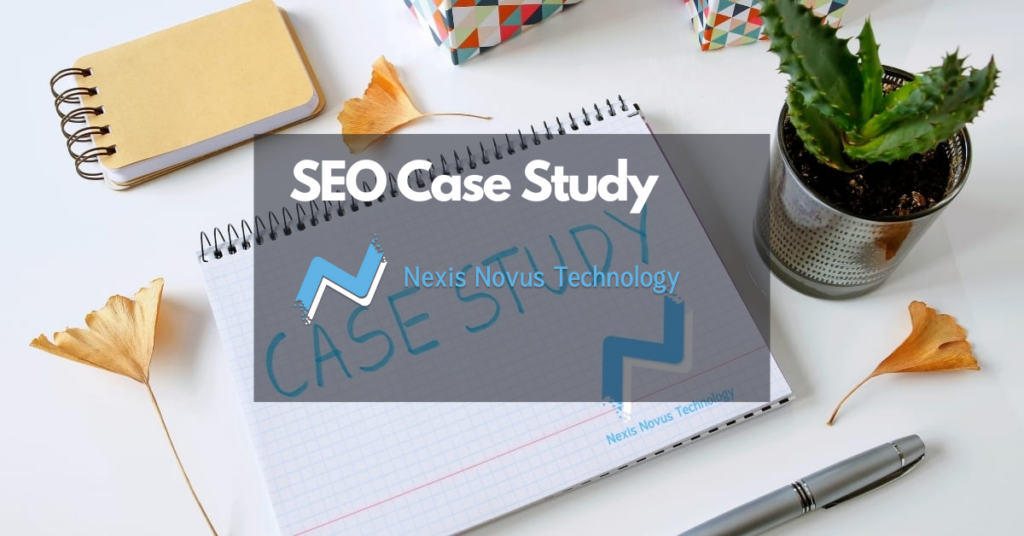A Certified SEO Services Company in Malaysia
Be Visible To Customer & Rank on Google Search Engine
Dominate on the First Page of Google Search Results with Search Engine Optimisation Strategy & Take the Lead Over Your Competitors Without Spending on Search Engine Marketing – Ads.
About Us – SEO Company Malaysia
Why Choose Us For SEO Services in Malaysia
Our certified in-house SEO experts in Malaysia highly distinctive focus on the best & latest practice of Google’s search algorithm with a proven case study. We aim to provide you with the ultimate search engine optimization (SEO) strategies, SEO keyword research, on-site and off-site optimization, content marketing, and quality backlinks to ensure a successful SEO campaign.
Expect your business to grow further with Nexis Novus Technology SEO solutions.
Grow With The Best SEO Company Malaysia.
SEO Campaigns
Happy Clients
SEO Tools
Our Search Engine Optimization SEO Core Areas by SEO Specialist
Nexis Novus Technology is the best SEO agency Malaysia that pays full attention to the importance of keyword analysis for your website. Our SEO experts’ main aim is to ensure your website ranks first on search engine results pages – gets more traffic & increases conversions.
Our SEO Company Malaysia Services Plan
Let’s Choose The Best SEO Packages For You!
We have various SEO services including local SEO, International SEO, eCommerce SEO, and more – fully managed SEO services by our SEO company solution provider, contact us for more information!
StartUp
- 3 Months SEO contract based
- Single Language – Google MY
- 10 SEO Keywords
- On Pages Technical SEO Site Audit
- Off Pages SEO – Backlinks Management
- 1 – 2 SEO Basic Content Article Write Up
- Google Analytics/Search Console/Business Setup
- Monthly Report
Pro
- 6 Months SEO contract based
- Single Language – Google MY
- 20 SEO Keywords
- On Pages Technical SEO Site Audit
- Off Pages SEO – Backlinks Management
- 1 – 2 SEO Basic Content Article Write Up
- Google Analytics/Search Console/Business Setup
- Monthly Report
Ultimate
- 6 Month SEO contract based
- Single Language – Google (International SEO)
- 30 SEO Keywords
- On Pages Technical SEO Site Audit
- Off Pages SEO – Backlinks Management
- 1 – 2 SEO Basic Content Article Write Up
- Monthly Report
- Google Analytics/Search/Business Setup
What Our Client Says!
On top of our best services in SEO, we also offer a wide array of services digital marketing services. It includes
- SEO Optimized Website Design
- Pay Per Click PPC – Google Ads
- Social Media Marketing & Ads
- SEO Content Optimization
Get SEO Quotation!
This site is protected by reCAPTCHA and the Google Privacy Policy and Terms of Service apply.
Our Search Engine Optimisation Practices
How Does Our SEO Malaysia Campaign Work?
Our SEO Malaysia campaign will improve your website ranking on Google Search Engine Results Page (SERP) hence increasing your website organic traffic.
SEO Audit & SEO Strategy Planning
You can trust us as your leading SEO company that runs a thorough and detailed analysis of your business’ website and provides the best SEO strategy & SEO Solution.
Keyword Research
Our SEO specialists help to rank the most related and profitable keywords for you! Using advanced technology – NLP to get the best quality & potential keywords for your business!
Advance On Page Optimization
Our team of SEO experts will work on optimizing your webpage, resolving errors, and improving content and user experience. With years of experience, we know that some of best on-page SEO factors that we should focus to optimize sooner & get results quicker!
Quality Off Page Optimisation
We aim to assist your brand in building quality external backlinks to increase website traffic and authority.
How Search Engine Optimization Creates Values For Companies in Malaysia

Improve Brand Credibility

Increase Visibility of Your Business On Major Search Engines

Drive Organic Traffics

Optimizing Cost – Reduce Ads Spending on Search Engine Marketing like Google Ads

Legit Quality Leads With Our Long Lasting SEO Strategy
Nexis Novus SEO Strategy
What Does Our SEO Services Included?
Strategy & Process Flow
Nexis Novus as the best SEO service company in Malaysia, has extensive experience and expertise in making your website Google-friendly. We specialize in keyword research, on and off page optimization, link building, Google Analytics tracking, and more.
Some of the strategic flow here are taken to optimize your website search engine ranking!
Build Your Business with SEO Company in Malaysia !
Importance of SEO Services !

If your business is depending more on the local market and selling through online or service providers, then Local SEO is one of the effective ways for your customers to find you – convert them into sales/leads. 92% of consumers go to Google to look for local businesses and up to 30% of them convert into customers.
Our local search optimization (SEO) service includes:
- Localized content strategy
- Competitors analysis
- Store locator optimization – Google My Business Profile

For businesses that grow either locally or globally, you will need to find a reliable SEO agency that can deliver the best Malaysia SEO services and it is no exception. Brand Credibility & potential for global customer opportunities await you! That is one of the biggest reasons you need an agency with SEO specialists like us that know how to expand your business locally and globally.
With the proven SEO strategies of our SEO experts, we are here to help you achieve your goal.
- Localized keyword strategy according to your target audience.
- Build a local presence through Google My Business Listing.
- Build SEO content that is relevant to each market & resonate with your customers.
SEO Resources
Our Curated SEO Trending Topics & News!
SEO Case Studies in Malaysia
We are proud to provide valuable SEO services – Local SEO, we help SME businesses in Malaysia grow and achieve their business goals. See how our SEO specialists successfully help clients to shape their online presence with our search engine optimization services. On top of that, we will be your next and only SEO services company in Malaysia – get your free SEO consultation with us now!
Do check out our Free SEO Audit Too!

Ready to Grow Your Organic Traffic?
F.A.Q.
Here are some common questions about SEO
What is SEO - Search Engine Optimization?
SEO (Search Engine Optimization) is the process of optimizing websites to get more traffic, hence increasing visibility on search engines such as Google. Google search engine is about 92% market share worldwide, if your business is not on Google? You are definitely missing out!
What is the best SEO company in Malaysia?
Nexis Novus Technology, for being the best SEO service provider company in Malaysia with extensive of experience & proven results in generating traffics for your website while is Google-friendly. We specialise in keyword research, on & off page optimisation, link building, Google Analytic, Search console & more.
How Much Does Nexis Novus Technology Charge for SEO Malaysia?
In general, most SEO pricing range from around RM1,000 to RM10,000 above and you can learn more about general SEO costing in Malaysia compiled by us. The price of SEO services varies depending on location and keyword difficulty.
Our SEO cost depends on various factors – chat with us to know more & get a Free SEO quotation!
SEO Vs SEM: Which One Should I Start With?
SEO improves various aspects of a website to help it acquire organic traffic and secure higher rankings on search results without ADS. On the other hand, SEM (Search engine marketing) involves other marketing techniques like paid advertising (PPC), Facebook ads, and so on. Check out Nexis Novus Technology’s comprehensive guide on SEO vs PPC
How Our Pakar SEO or SEO Specialist Execute SEO Marketing Campaign for You?
With the ever-changing Digital Marketing landscape especially in SEO where the Google Algorithm changes more than 500 to 600 times a year, which is where our Pakar SEO Malaysia comes into play to help you run a successful campaign. There are various tactics and strategies that can use to help your website rank higher on Google Search. The knowledge, experience, and expertise of our Pakar SEO can help you create the best campaigns for your business. These experts are always up to date with the changes in the rankings of the internet. If you want to improve your ranking and drive more traffic to your website, you should partner with an expert. You will be in front of the competition because of the services that are offered.
How Long Does SEO Rank My Websites?
In general, targeting competitive keywords will take up to a minimum of 6 months to a year.









![SEO Agency Vs In-House SEO? | Which One is Best [2023] Outsourcing SEO Agency Vs In-House SEO? Which One Is Best?](https://nexisnovus.com/storage/2020/07/12-Best-Kitchen-Cabinets-Malaysia-7-1024x536.jpg)
![Where & How To Add SEO Keywords To Your Website [2024] Where & How To Add SEO Keywords To Your Website - A comprehensive guide by Nexis Novus](https://nexisnovus.com/storage/2023/05/How-To-Add-SEO-Keywords-To-Your-Website-1024x536.png)
![How To Do Keyword Research For SEO? Ranking Secrets [2023] How To Do Keyword Research for SEO? Step by Step Guide to help you reveal ranking secrets by doing the basic right!](https://nexisnovus.com/storage/2022/06/10-1024x536.png)
![SEO vs PPC - What are the Differences and which to Choose? [2023] SEO vs PPC (SEM) Which Option Is Better For You?](https://nexisnovus.com/storage/2022/05/11-1024x536.png)
![SEO Price Malaysia - How Much Does SEO Cost? [2024] SEO Price Malaysia - How Much Does SEO Cost by Nexis Novus Technology](https://nexisnovus.com/storage/2022/05/12-1024x536.png)
![Is SEO Cost Effective? Find Out Its Benefits For You [2023] Is SEO Cost Effective? Learn How Does SEO benefits you with Nexis Novus Technology](https://nexisnovus.com/storage/2022/03/15-1024x536.png)

![Google My Business Malaysia (GMB) | A Local SEO Guide [2024] Google My Business Malaysia Guide and Why It Matters for Malaysia Business by Nexis Novus Technology](https://nexisnovus.com/storage/2020/08/18-1024x536.png)
![Introduction of SEO | SEO for Beginners [2023] Introduction of SEO | Search Engine Optimization [2023]](https://nexisnovus.com/storage/2020/05/19-1024x536.png)